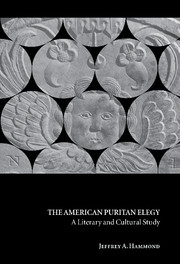Book contents
- Frontmatter
- Contents
- Preface
- Acknowledgments
- Introduction
- Chapter 1 Monuments enduring and otherwise
- Chapter 2 Toward an anthropology of Puritan reading
- Chapter 3 Weep for yourselves: the Puritan theology of mourning
- Chapter 4 This potent fence: the holy sin of grief
- Chapter 5 Lord, is it I?: Christic saints and apostolic mourners
- Chapter 6 Diffusing all by pattern: the reading of saintly lives
- Epilogue: Aestheticizing loss
- Notes
- Works cited
- Index
Preface
Published online by Cambridge University Press: 22 September 2009
- Frontmatter
- Contents
- Preface
- Acknowledgments
- Introduction
- Chapter 1 Monuments enduring and otherwise
- Chapter 2 Toward an anthropology of Puritan reading
- Chapter 3 Weep for yourselves: the Puritan theology of mourning
- Chapter 4 This potent fence: the holy sin of grief
- Chapter 5 Lord, is it I?: Christic saints and apostolic mourners
- Chapter 6 Diffusing all by pattern: the reading of saintly lives
- Epilogue: Aestheticizing loss
- Notes
- Works cited
- Index
Summary
Like many books, this one began in frustration. A few years back, while pruning the bloated first draft of a study of American Puritan poetry, I removed a three-chapter section dealing with the funeral elegy. It pained me to do so: I was pursuing a cultural reading of Puritan verse, and regretted omitting a full discussion of the most popular poems of the era. Still, I couldn't get these strange old poems out of my mind. There remained something more compelling about them than their wooden surfaces could explain, and since they both repulsed and attracted me, it seemed important to understand why. Accounting for the repulsion was easy enough. Like others of my professional generation, I had been trained to value poems that differed radically from these repetitive, predictable laments for the Puritan dead. Accounting for my attraction took more probing, but three reasons finally emerged. First, the Bible-centered Protestantism that stamped my earliest years probably made these poems less alien to me than they seemed to other readers, at least if the commentary surrounding them was any indication. Second, these poems, for all their deviation from modern taste, articulate the larger relationship between language and loss, between words and the absence that their use inevitably invokes. Nowhere does the issue seem more real – less glibly theoretical or aridly intellectual – than in elegiac texts, which exist precisely because their human referents are gone.
- Type
- Chapter
- Information
- The American Puritan ElegyA Literary and Cultural Study, pp. xiii - xivPublisher: Cambridge University PressPrint publication year: 2000

